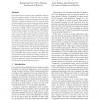Free Online Productivity Tools
i2Speak
i2Symbol
i2OCR
iTex2Img
iWeb2Print
iWeb2Shot
i2Type
iPdf2Split
iPdf2Merge
i2Bopomofo
i2Arabic
i2Style
i2Image
i2PDF
iLatex2Rtf
Sci2ools
FAST
2009
2009
Tiered Fault Tolerance for Long-Term Integrity
Fault-tolerant services typically make assumptions about the type and maximum number of faults that they can tolerate while providing their correctness guarantees; when such a fault threshold is violated, correctness is lost. We revisit the notion of fault thresholds in the context of long-term archival storage. We observe that fault thresholds are inevitably violated in longterm services, making traditional fault tolerance inapplicable to the long-term. In this work, we undertake a "reallocation of the fault-tolerance budget" of a long-term service. We split the service into service pieces, each of which can tolerate a different number of faults without failing (and without causing the whole service to fail): each piece can be either in a critical trusted fault tier, which must never fail, or an untrusted fault tier, which can fail massively and often, or other fault tiers in between. By carefully engineering the split of a long-term service into pieces that must obey disti...
| Added | 17 Feb 2011 |
| Updated | 17 Feb 2011 |
| Type | Journal |
| Year | 2009 |
| Where | FAST |
| Authors | Byung-Gon Chun, Petros Maniatis, Scott Shenker, John Kubiatowicz |
Comments (0)

